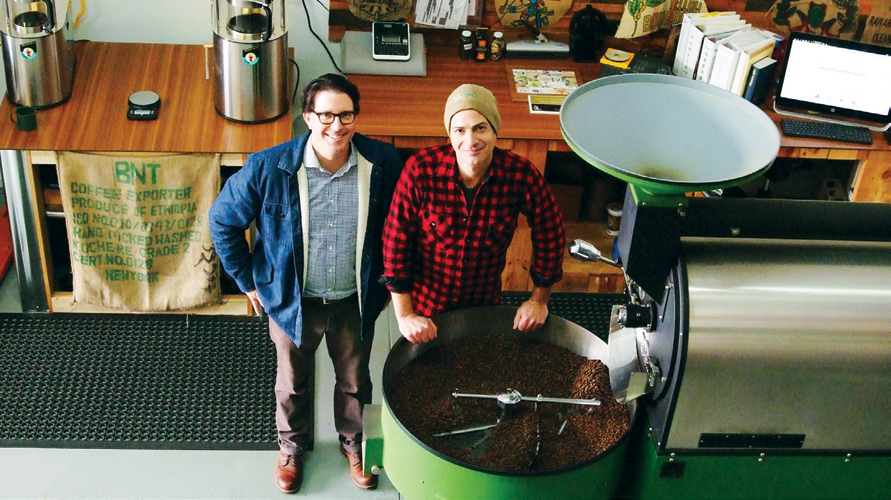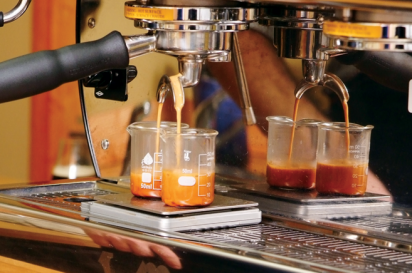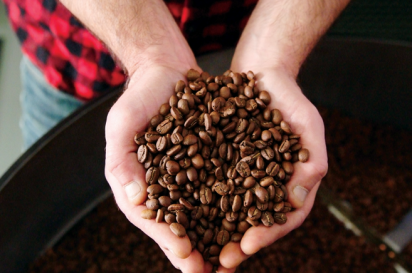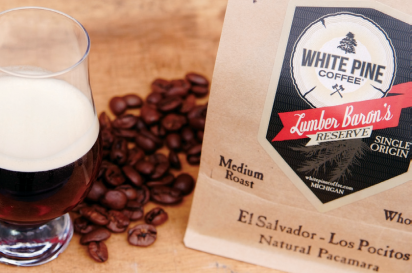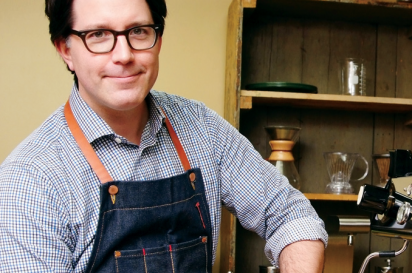White Pine Coffee
The White Pine (Pinus strobus) was Michigan’s original commodity crop, the species that launched an industry that built Michigan’s quintessential culture and legacy. And it’s the ethos of that legacy that grounds—no pun intended—Lake Orion–based coffee roasting coffee White Pine Coffee here in Michigan.
“In Michigan, before auto, it was lumber. We wanted to pay homage to that,” says White Pine’s Bryan Meganck. So he and co-founders Megan Meganck (Bryan’s wife) and Brad Kopek are elevating another commodity crop—coffee—by building a roastery around the lore of Michigan’s logging history. “We wanted to appeal to a large demographic and one that probably hadn’t been exposed to specialty coffee much,” says Kopek. “When we sat down and had brainstorming sessions, White Pine surfaced pretty quickly. Like White Pine, coffee is a commodity crop.”
Each blend is named after positions in the old Michigan lumber camp, inviting you to imagine them as you sip the hot brew. “River Hog, our light roast, is named after the guys that actually roll the logs down the river from the camps to the sawmill,” says Meganck. “We imagined that they would want a really light, caffeinated roast to keep them awake. Then you have Shanty Boys, our house blend. Shanty Boys were the actual lumberjacks. They would be working all day so they would want a drinkable coffee that they could drink all day.” Meganck continues down the line. Timber Cruiser is named after the workers that coordinated with the lumber barons to find the tracts of forest that the lumberjacks could cut.
“We envisioned that he would have liked a French Roast, being a much more provisioned and technical person,” he says. Then there’s the Sawmill Espresso, a steam-powered espresso named after a steam-powered lumber mill. Finally, the Lumber Baron’s Reserve are a set of high-end single-origin coffees. The Megancks and Kopek are hoping to build a coffee scene here in Southeast Michigan to rival the ones that now dominate big cities like Portland and Seattle. Even Grand Rapids is ahead of metro Detroit, they note.
“What we have is a lot of blue-collar drinkers who are just learning to spend money on finer things,” says Meganck. “It used to be a value thing. You go to Costco and you get a big bucket for $10. You’re, like, ‘Whoo-hoo!’ Then you realize ‘Oh, my God, now I’ve got to drink this crap.’”
They’re working toward their goal through coffee tastings, menu partnerships, open houses and classes. “It’s conditioning people, just like small-batch microbreweries and different flavors of beer,” says Meganck. “Ten years ago you wouldn’t contemplate a pineapple IPA, you were then, like, ‘Oh, my God, no, just give me a Molson.’ It’s come a long way.”
White Pine Coffee currently operates out of a nondescript industrial park in Lake Orion, where the co-founders roast, blend, taste and fill orders. Meganck acts as the “mad scientist,” sourcing, roasting and blending all the coffee for the company. Kopek works on sales and consumer education. The partners don’t see themselves opening a retail space, but they are interested in moving to a more accessible location and opening a tasting room somewhere in northern Oakland County.
Meganck and Kopek both grew up in Pontiac and are thinking about the possibility of moving their operation back to their hometown, where they already supply coffee for Slows Bar BQ. The coffee line is also available in Whole Foods, Market Square, Market Fresh and Busch’s Fresh Food Market.
WPC is adamant about making the coffee accessible and helping people learn how to prepare it to maximize their experience and the value of the product. “It’s really educating the consumer on how to brew best,” says Kopek. “There’s so much misinformation about coffee.
Half of the educational job is undoing the bad habits people have learned over the past 30 or 40 years.” That means helping people understand what they are buying, using the right type and amount of water and the right method. “They don’t realize it, but most of the time they’re buying old beans, brewing them incorrectly and the beans have defects to start,” he says. “Every step along the supply chain really counts in coffee. You can’t skip a step. Connecting the last step to the consumer is a lot of what my job is.”
A key part is making sure people aren’t intimidated, something that Kopek and Meganck acknowledge is often the case in the hallowed coffee scenes of the West Coast. “It’s a very snarky, dismissive attitude in general at the high end of the coffee chain,” says Meganck. “If I ask a question I don’t want to be judged because I didn’t know the answer. I guess our ultimate goal is to bring just a bit of Midwestern hospitality into the local coffee scene.”


